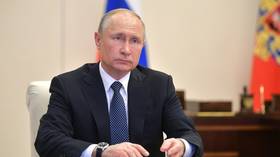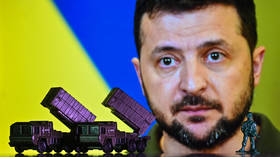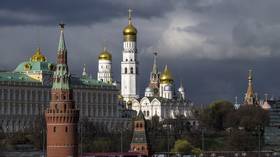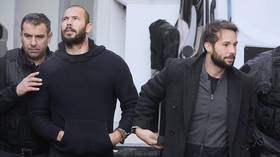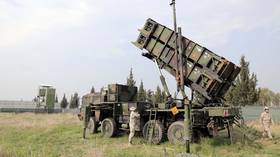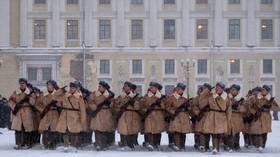Like the ‘Gerasimov Doctrine’ it spawned, it’s time to retire the concept of ‘Russia Watching’
If you’re interested in Russia, you’ve surely encountered “Russia Watching.” A concept with questionable utility, given far too much credibility on this beat.
[MOSCOW] - As the title implies, “Russia Watchers” don’t reside in Russia. Indeed, many have never have done so, at any stage, and some haven’t even ‘lowered’ themselves to visit. Instead, like Peter Sellers’ ‘Chance the Gardner,’ they “like to watch” and are elevated beyond their station by credulous hacks, in a severe case of the blind leading the blind.
And, in a reasonable world, with assiduous and scrupulous media standards, you wouldn’t know of their existence and they’d be left to exchange their conspiracy theories with other fantasists busybodies and amateur enthusiasts on Reddit or obscure blogs.
READ MORE: In Western media, publishing fake news about Russia is a good career move… with no consequences
But we don’t live on that sort of planet. Sadly, Western coverage of Russia is so dysfunctional that various chancers and charlatans flood the media space debating things like the ‘Gerasimov Doctrine’ and whether Vladimir Putin has Aspergers or Spine Cancer, or is about to invade the Baltics, or Belarus, or Poland. All on the same weekend. In addition to other topics which either don’t exist or would require expertise, and access, these spoofers can’t boast.
Another bugbear is how many “Russia Watchers” actually seem to believe they occupy a higher plane of being than journalists who cover Russia from the ground. And their disdain is also frequently directed at correspondents for Western media, not only those of us working for Russian outlets.
In reality, being labelled a “Russia Watcher” should be contemptuous. Because, let’s face it, if it were raining soup, most of these quacks would be out on the street with forks. Not here in Russia, of course. Rather in places like London and Washington, where most of them seem to have pitched their tents.
Piquant precipitation
While this writer’s contempt of and aversion to the breed is eternal, a weekend tweet prompted this particular bout of spleen venting. And it came courtesy of Mark Galeotti, one of those “senior fellow” chaps who are to this circuit what smog and acid rain are to Norilsk: an unavoidable hazard.
Although Molly McKew was the midwife and remains the godmother of the ‘Gerasimov Doctrine’ trope, this British analyst was its creator. He coined the term in a blog which was based on the poor translation of a Russian-language speech by the general, published in the Military-Industrial Courier, six years ago.
And in doing so, he made the previously obscure, outside of Russia, Valery Gerasimov into a sort of contemporary Sun Tzu. In fairness, Galeotti later apologised, albeit seven months after it had been debunked here on RT. Which he didn’t acknowledge because, naturally, to “Russia Watchers,” Russian media has no agency unless it is pro-West. And the same goes for Russian journalists, let alone Westerners who came here and realised it’s not Mordor.
Also on rt.com The problem with the 'Gerasimov Doctrine' is that it doesn’t existAnyway, circling back to the point, here’s the aforementioned tweet: “Russia an increasingly ‘normal’ country… with an abnormal regime. Sunday-morning reading of Ekaterina Schulmann’s brilliant and optimistic lecture on the growing ‘normalcy’ of Russian society led to a few thoughts and much to praise.”
Did it ever occur to you that the government (or 'regime' as you put it, Schulmann uses "powers that be" or "current authorities") is responsible for creating a stable environment. And it's more to do with cause and effect than "in spite of?"
— Bryan MacDonald (@27khv) January 27, 2019
For the uninitiated, Schulmann is a highly respected Russian political scientist who is prominent in Russian media and particularly associated with newspaper Vedomosti and radio station Echo of Moscow. Both of which are considered to be critical of Putin’s Kremlin.
In her comments, she laid into the Russian government while insisting how over the past five years (post-Crimea/Kiev Maidan), the country at large has matured politically and is recovering from its post-Soviet hangover or “social atomisation,” as she prefers. Also, Schulmann laments the absence of a fresh political force, blaming the current authorities for stifling the prospect.
Effervescent evangelism
Now, while it’s delivered eloquently, this is nothing radical for those of us who live here. Because it amounts to everyday conversation, among those of a political bent.
Yet, Galeotti reacts as if he’s just been handed the location of the Holy Grail. Then, in his accompanying blog post, predictably and depressingly, makes it about “Westernisation” and “what Westerners might consider ‘normalcy.’” Something not at all in the spirit of Schulmann’s argument, which doesn’t seek ‘direction’ from the West at all.
As a matter of fact, this has been the biggest change I’ve detected in Russians over the past decade: the gradual erosion of interest in how the country is perceived by the West and Westerners. Added to the abandonment of any desire to become part of the US-led and dominated world. Or “liberal international order” to use the US/UK press synonym.
He also fails to explain why the Russian government is “abnormal” and what he regards as “normal.” Perhaps he regards the current British set up as “normal,” despite nobody knowing if they’ll be in or out of the European Union just two months from now.
Or maybe the US, where President Trump is openly at war with the “deep state.” Not to mention, France, which is engulfed in civil disorder, with now weekly pitched battles between security forces and “Yellow Vest” protesters.
Anyway, I asked Galeotti “did it ever occur to you that the government… is responsible for creating a stable environment. And it’s more to do with cause and effect than “in spite of?”
I added how Schulmann uses “powers that be” or “current authorities” rather than “regime.” As her terms were “ власти/властью (more like ‘authorities,’ in Russian interchangeable with ‘government’) and действующей властью (‘powers that be’) and she didn’t use words such as режим or диктатура.
All told, a perfectly reasonable question to which he had no answer. Probably because there is no way to reply which fits the Western media and academic narrative of “Duma bad, Kremlin awful, Putin worse” etc.
No rose bed
The fact is there’s a lot wrong with how Russia is governed. Inequality is astonishing, by West European standards (except Britain), and there’s a lack of genuine political competition, which is as much down to public apathy as systemic machinations (witness the sub 2% polling and ‘trust rating’ numbers of Alexei Navalny and Ksenia Sobchak, despite their ubiquitous social media, and broader online, reach). And another elephant in the room is corruption, despite a certain amount of progress in curtailment. Although to fully appreciate these issues, you have to take into account the swings and roundabouts of the past thirty years.
READ MORE: Russian elections: Pro-Kremlin domination amid protests, but some hope for opposition in regions
At this point, in case it’s misunderstood as a personal attack, Galeotti’s genuine areas of expertise should be noted. He’s an excellent writer on organised crime, especially in the Russian, and broader post-Soviet context. And the English analyst is more fair-minded and knowledgeable than most of the myriad toxic hucksters currently trading in Russia scares.
He’s also far from alone in enjoying a media profile beyond his credentials. Some other “Russia Watchers” who spring to mind are Anne Applebaum and Michael Weiss, both of whom have been on the think tank gravy train denouncing Russia, and are rarely, if ever, seen in Russia itself. And, of course, Brian Whitmore, who, until recently, formed a particularly gruesome twosome, with Galeotti, at US state broadcaster RFE/RL, regaling their tiny listenership with tales of Russian badness. Also, don’t forget journalists like Edward Lucas and Peter Hitchens, who last lived in Russia in the Yeltsin years and seem to think clocks were frozen in 1999.
So, to clarify, the issue here is not with Galeotti personally, it’s with the entire concept of “Russia Watching.” And the damage it’s doing to perceptions of the country abroad. Especially among Western policy makers, who are taking guidance from these sources. Which, sadly, contributes to policy failures.
For instance, I was born and raised in Ireland, but I rarely cover Irish affairs because I’ve spent ten of the past 12 years outside it, and I’d feel like a fraud passing judgement on the contemporary Irish scene. Because I can’t, in all honesty, judge present challenges, aspirations and yearning.
Instead, I look on from afar and interpret my homeland through the eyes and ears of those more qualified. “Russia Watchers” might consider doing likewise when it comes to Russia and its various shades and shadows.
Think your friends would be interested? Share this story!
The statements, views and opinions expressed in this column are solely those of the author and do not necessarily represent those of RT.




